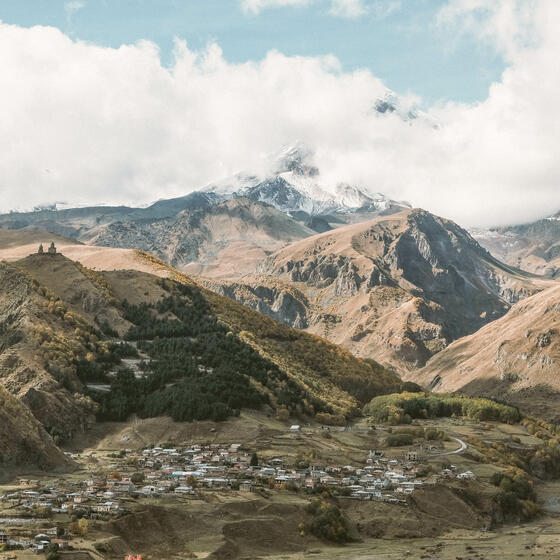Don’t be deceived by the brutalist architecture: this communist publishing house-turned-hotel in the dynamic Georgian capital offers the warmest of welcomes – and a multitude of sustainable, design-forward diversions
17 March, 2023
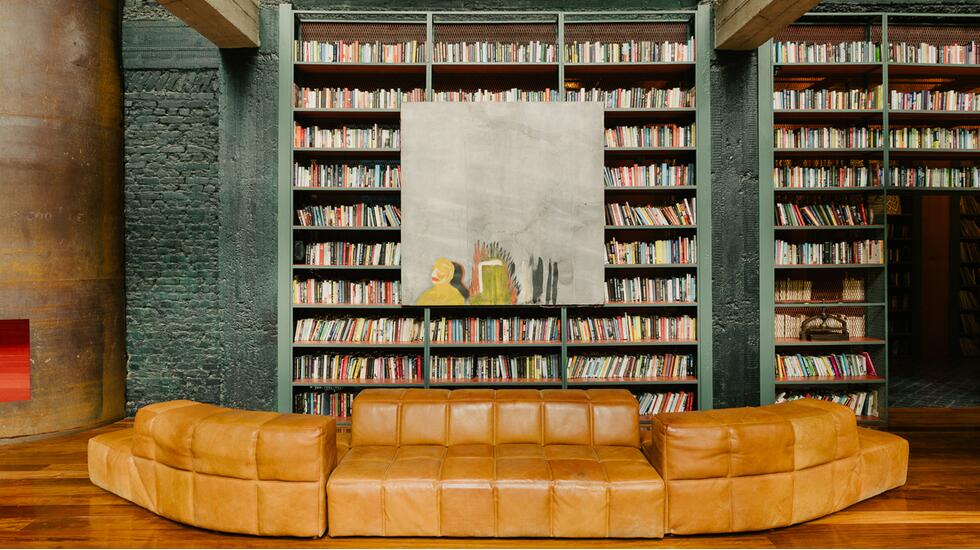
On
first stepping inside Stamba Hotel, it’s hard not to gasp. In
the IMAX-scale atrium lobby of this 1930s publishing house, five
floors have been removed, leaving only the rugged structural
columns for support. The printing equipment from which Georgia’s first communist newspaper once
emerged is still in place, now sprouting a jungle of foliage. Red
neon illuminates a labyrinth of bookshelves – just a fraction of
the property’s 84,000-strong curated book collection, made up
almost exclusively of English-language titles spanning Elvis
biographies to the classics. Contemporary Georgian art is
everywhere – including a sky-high pair of giant rabbit sculptures,
watching over it all.
A 140-key member of Design Hotels serviced by a staff of 500,
“boutique” is something of an oxymoron when describing this
brutalist wonderland. Over the past decade, its owner, Adjara
Group, has demonstrated a rare knack for taking old superstructures
and turning them into community touchstones – see also Rooms
Kazbegi hotel, set in a Soviet-era sanatorium in the country’s
mountainous north; Tbilisi’s Fabrika hostel, in what was once a
sewing factory; and TEC, a quartet of gritty, achingly cool
nightclubs operating across a cavernous former electrical plant on
the left bank of the Mtkvari River.
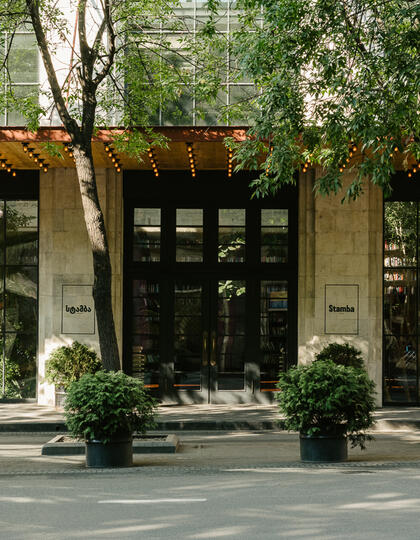

The hotel’s leafy front doors, left, and floor-to-ceiling
bookshelves frame a door.
In addition to Stamba’s much-lauded guest rooms, the property is
home to a sustainable SpaceFarms hydroponics project, growing microgreens,
miniature vegetables and edible flowers for the in-house restaurant
and beyond, an ethical coffee roastery, bean-to-bar chocolatier,
design shop, sewing atelier – responsible for the team’s fabulous,
highly stylised uniforms – and Tbilisi Photography & Multimedia Museum –
the first institution in Georgia dedicated to the contemporary
image in all its forms.
Even in a boundlessly creative city that buzzes with a
never-sleeps breed of energy, the 2018-opened Stamba has always
been ahead of the curve – proving that Tbilisi’s accommodation
offering has not just stepped out from behind the Iron Curtain but
performed a high-kicking song-and-dance act worthy of many encores.
As grand eastern European hotels go, it’s impossible to imagine how
even the great Wes Anderson might have improved on this one.
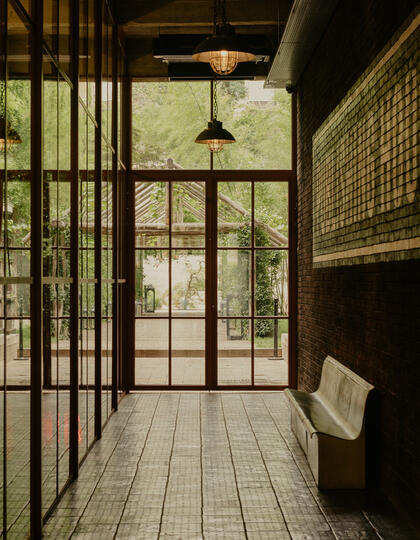
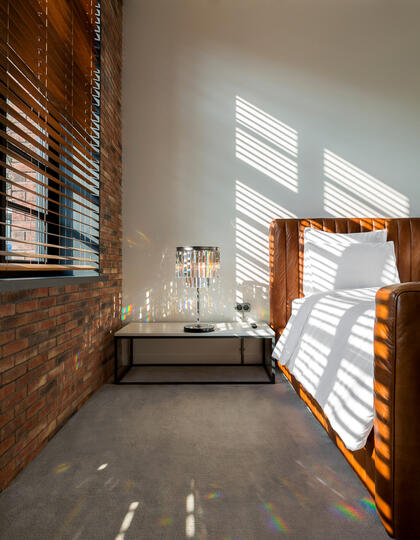
An industrial-luxe living space, and one of the hotel’s
light-filled suites.
Sprawling over 52sq m, all 62 rooms offer a
nothing-feels-accidental, industrial-luxe aesthetic. Think more
books, more art, exposed brickwork, a huge bed with buttery tan
leather headboard, fully stocked bar, coffee machine, white sofa,
round, flokati-covered chair, desk – with red rotary phone – and
magnificent freestanding copper bathtub.
Bathrooms have bespoke scarlet tiles, standalone brass showers
and built-to-last Catchpole & Rye fittings – after getting used
to a wooden toilet seat, you’ll never want to encounter another
plastic one again.
Not just for residents, Café Stamba is a favourite meeting place
among local hot-deskers, offering all of the kudos of a London
members’ club without any of the “look at me” vibes. Start with the
organic in-house-roasted coffee – ethically sourced in Costa Rica,
Columbia, Venezuela and Madagascar – then take your pick from a
menu that runs the gamut from matcha yoghurt and homemade
viennoiserie to ricotta pancakes with banana and honey.
You’ll gladly return to Café Stamba. Decked out in soothing,
sage-green mosaic tiles, the all-day menu delivers an avant-garde
take on Georgia’s diverse cuisine, along with the spoils of its
open Asian kitchen, whose specialities include ramen and
in-house-made noodles. Try the famously indulgent cheesy khachapuri
– best paired, the traditional way, with a glass of cream
soda-flavoured Laghidze water – then work your way through a menu
of crowd-pleasing Georgian classics such as a caramelised plum
salad, Georgian trout with sautéed swiss chard, and chicken with
pomegranate and walnuts. Desserts are as gorgeous as the signature
blue crockery on which they’re served.
A local institution, the Pink Bar serves up zingy cocktails,
craft beers and spirits under a glittering, outsized crystal
chandelier. Our order? A slow dive – a blend of chacha, pisco,
port, pear liqueur and lime. For people-watching, grab a seat in
the Lobby Bar.
All the home-from-home comforts you could hope for, from fast,
free WiFi to fluffy robes and high-end, heavenly fragranced Prija
products. Don’t leave without visiting The Shop – a destination in
its own right selling design-led gifts, art prints, locally made
jewellery and a range of pyjamas, jumpsuits and vintage fabric
co-ords whipped up in the in-house atelier. Also unmissable is the
second-floor Tbilisi Photography & Multimedia Museum, where a
Patti Smith show is in the pipeline. Check the website for
dates.
Robust, across the board, but particularly of note is the
SpaceFarms hydroponics project, which produces – at twice the speed
of traditional growing methods and using 75 per cent less water –
pesticide-free leafy and micro greens, miniature vegetables and
edible flowers for the hotel and beyond. The rest of the produce
comes from the Adjara Group’s 15,000 hectares of responsibly farmed
arable land in Kakheti, a 90-minute drive east of the capital.
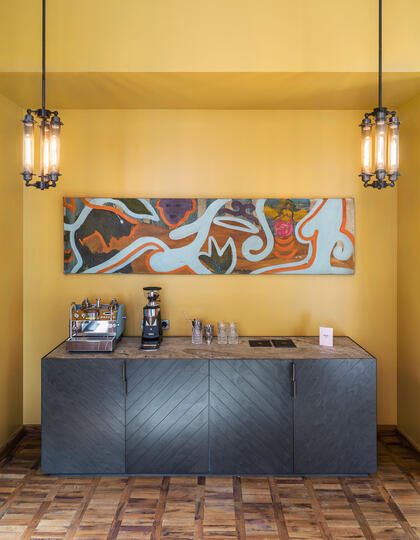

A colourful coffee station, left, and a sneak peek at what’s
on the menu.
Berlin-cool creatives and next-gen entrepreneurs.
While Rustaveli Avenue – site of the Georgian National Museum,
the Opera and Ballet Theater and the Parliament of Georgia – is
practically on your doorstep, make time, too, to zig-zag around
Vera’s hilly backstreets, home to vintage boutiques that look more
like galleries (including the swoon-worthy Fidel), pet shops, old-school tailors, cafés,
restaurants (Alubali is a standout) and hidden gardens.
Stamba’s older sister, Rooms
Tbilisi, and its restaurant, The Kitchen, can be accessed via a
connecting tree-lined courtyard complete with events-ready
amphitheatre, part of Adjara Group’s ever-growing co-working
development, D Block, or through a subterranean car park – think
John Wick’s Continental Hotel.
Early flight to catch? Order a breakfast to go from reception.
Any of the four box options will go some way towards easing the
pain of leaving.
Discover more about Stamba Hotel in Vol. 40: Visionary
This article contains affiliate links, which means SUITCASE
may earn a small commission if you click through and book.
